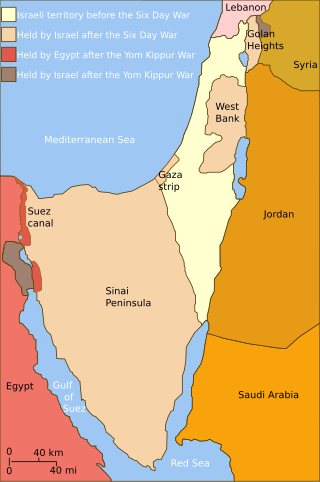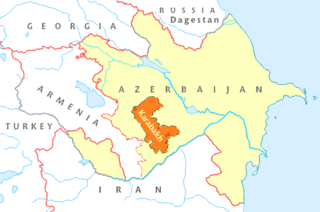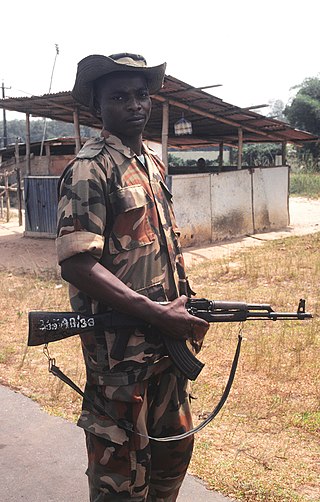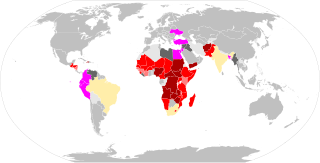Related Research Articles

A ceasefire, also spelled cease fire, is a stoppage of a war in which each side agrees with the other to suspend aggressive actions, often due to mediation by a third party. Ceasefires may be between state actors or involve non-state actors.

United Nations Security Council Resolution 338 was a three-line resolution adopted by the UN Security Council on 22 October 1973, which called for a ceasefire in the Yom Kippur War in accordance with a joint proposal by the United States and the Soviet Union. It was passed at the 1747th Security Council meeting by 14 votes to none, with China abstaining.

United Nations Security Council resolution 874, adopted unanimously on 14 October 1993, reaffirmed sovereignty and territorial integrity of the Azerbaijani Republic and of all other States in the region, called for the preservation of the ceasefire, cessation of hostilities and withdrawal of forces from recently occupied districts of the Republic of Azerbaijan, and reaffirmed resolutions 822 (1993) and 853 (1993). The Council expressed its concern at "...the conflict in and around the Nagorny Karabakh region of the Azerbaijani Republic, and of the tensions between the Republic of Armenia and the Azerbaijani Republic...", and called upon the parties to observe the ceasefire agreed with by the government of Russia and OSCE Minsk Group.

United Nations Security Council Resolution 1860, adopted on January 8, 2009, after recalling resolutions 242 (1967), 338 (1973), 1397 (2002), 1515 (2003) and 1850 (2008) on the Israeli–Palestinian conflict, the Council called for an immediate ceasefire in the Gaza War following 13 days of fighting between Israel and Hamas.

United Nations Security Council resolution 985, adopted unanimously on 13 April 1995, after reaffirming resolutions 813 (1993), 856 (1993), 866 (1993), 911 (1994), 950 (1994) and 972 (1995), and 788 (1992) which imposed an arms embargo on Liberia, the council established a committee to monitor the implementation of the embargo and extended the mandate of the United Nations Observer Mission in Liberia (UNOMIL) until 30 June 1995.

United Nations General Assembly Resolution 68/262 was adopted on 27 March 2014 by the sixty-eighth session of the United Nations General Assembly in response to the Russian annexation of Crimea and entitled "territorial integrity of Ukraine". The nonbinding resolution, which was supported by 100 United Nations member states, affirmed the General Assembly's commitment to the territorial integrity of Ukraine within its internationally recognized borders and underscored the invalidity of the 2014 Crimean referendum. Eleven nations voted against the resolution, while 58 abstained, and a further 24 states were absent when the vote took place.
The following lists events that happened with or in collaboration with the United Nations and its agencies in the year 2020.

The COVID-19 pandemic has had far-reaching consequences beyond the spread of the disease itself and efforts to quarantine it, including political, cultural, and social implications.
COVID-19 Solidarity Response Fund was a global fund for supporting the work of the World Health Organization (WHO) in containing the COVID-19 pandemic. It was launched on 13 March 2020 by the United Nations Foundation and the Swiss Philanthropy Foundation in support of WHO, and was announced by the Director-General of WHO in Geneva, Switzerland. The fund ceased its active fundraising activities at the end of 2021, with further donations to be directed to the WHO Foundation.

This article documents the chronology of the response to the COVID-19 pandemic in March 2020, which originated in Wuhan, China in December 2019. Some developments may become known or fully understood only in retrospect. Reporting on this outbreak began in December 2019.

This article documents the chronology of the response to the COVID-19 pandemic in April 2020, which originated in Wuhan, China in December 2019. Some developments may become known or fully understood only in retrospect. Reporting on this pandemic began in December 2019.

The World Health Organization (WHO) is a leading organisation involved in the global coordination for mitigating the COVID-19 pandemic within the broader United Nations response to the pandemic.

The COVID-19 pandemic has affected international relations and has caused diplomatic tensions, as well as resulted in a United Nations Security Council resolution demanding a global ceasefire.

During the COVID-19 pandemic, food insecurity intensified in many places. In the second quarter of 2020, there were multiple warnings of famine later in the year. In an early report, the Nongovernmental Organization (NGO) Oxfam-International talks about "economic devastation" while the lead-author of the UNU-WIDER report compared COVID-19 to a "poverty tsunami". Others talk about "complete destitution", "unprecedented crisis", "natural disaster", "threat of catastrophic global famine". The decision of the WHO on 11 March 2020, to qualify COVID as a pandemic, that is "an epidemic occurring worldwide, or over a very wide area, crossing international boundaries and usually affecting a large number of people" also contributed to building this global-scale disaster narrative.
A global ceasefire is a temporary stoppage of war on a planetary scale, i.e., by every country. A global ceasefire was first proposed by United Nations Secretary-General António Guterres on Monday, 23 March 2020, as part of the United Nations' response to the COVID-19 pandemic. On 24 June 2020, 170 UN Member States and Observers signed a non-binding statement in support of the Appeal, and on 1 July 2020, the UN Security Council passed a resolution demanding a general and immediate cessation of hostilities for at least 90 days and requesting that the UN Secretary-General accelerate the international response to the coronavirus pandemic.

United Nations Security Council Resolution 2532 was adopted on 1 July 2020. The resolution is a response to United Nations Secretary-General António Manuel de Oliveira Guterres' 'Appeal for Global Ceasefire' of Monday, 23 March 2020, and, as the first global ceasefire, is part of the United Nations' response to the COVID-19 pandemic.

The United Nations response to the COVID-19 pandemic has been led by its Secretary-General and can be divided into formal resolutions at the General Assembly and at the Security Council (UNSC), and operations via its specialized agencies and chiefly the World Health Organization in the initial stages, but involving more humanitarian-oriented agencies as the humanitarian impact became clearer, and then economic organizations, like the United Nations Conference on Trade and Development, the International Labour Organization, and the World Bank, as the socioeconomic implications worsened.

This article documents the chronology of the response to the COVID-19 pandemic in September 2020, which originated in Wuhan, China in December 2019. Some developments may become known or fully understood only in retrospect. Reporting on this pandemic began in December 2019.

This article documents the chronology of the response to the COVID-19 pandemic in October 2020, which originated in Wuhan, China in December 2019. Some developments may become known or fully understood only in retrospect. Reporting on this pandemic began in December 2019.

United Nations Security Council Resolution 2623 called for the eleventh emergency special session of the United Nations General Assembly on the subject of the 2022 Russian invasion of Ukraine. Albania and the United States introduced the resolution before the United Nations Security Council, which adopted it on 27 February 2022. Russia voted against while China, India and the United Arab Emirates abstained. As this was a procedural resolution, no permanent member could exercise their veto power.
References
- ↑ "A/RES/74/270 - E - A/RES/74/270". undocs.org. Retrieved 2020-08-02.
- ↑ "UNGA adopts resolution calling for global solidarity, cooperation to fight COVID-19". The Economic Times. Retrieved 2020-08-02.
- ↑ "UNGA adopts resolution on Covid-19". Livemint. 2020-04-03. Retrieved 2020-08-03.
- ↑ "A/RES/74/274 - E - A/RES/74/274". undocs.org. Retrieved 2020-08-02.
- ↑ "UN General Assembly calls for swift global access to coronavirus vaccinations". UN News. 2020-05-06. Retrieved 2020-08-02.
- ↑ "COVID-19 and multilateral governance at the United Nations between risk-prevention, procedural adaptation and feeble response". QIL QDI. 2020-06-19. Retrieved 2020-08-03.
- ↑ "Security Council Underlines Support for Secretary-General's Global Ceasefire Appeal, Fight against COVID-19, Unanimously Adopting Resolution 2532 (2020) | Meetings Coverage and Press Releases". www.un.org. Retrieved 2020-08-02.
- ↑ "Stalled Security Council resolution adopted, backing UN's global humanitarian ceasefire call". UN News. 2020-07-01. Retrieved 2020-08-01.